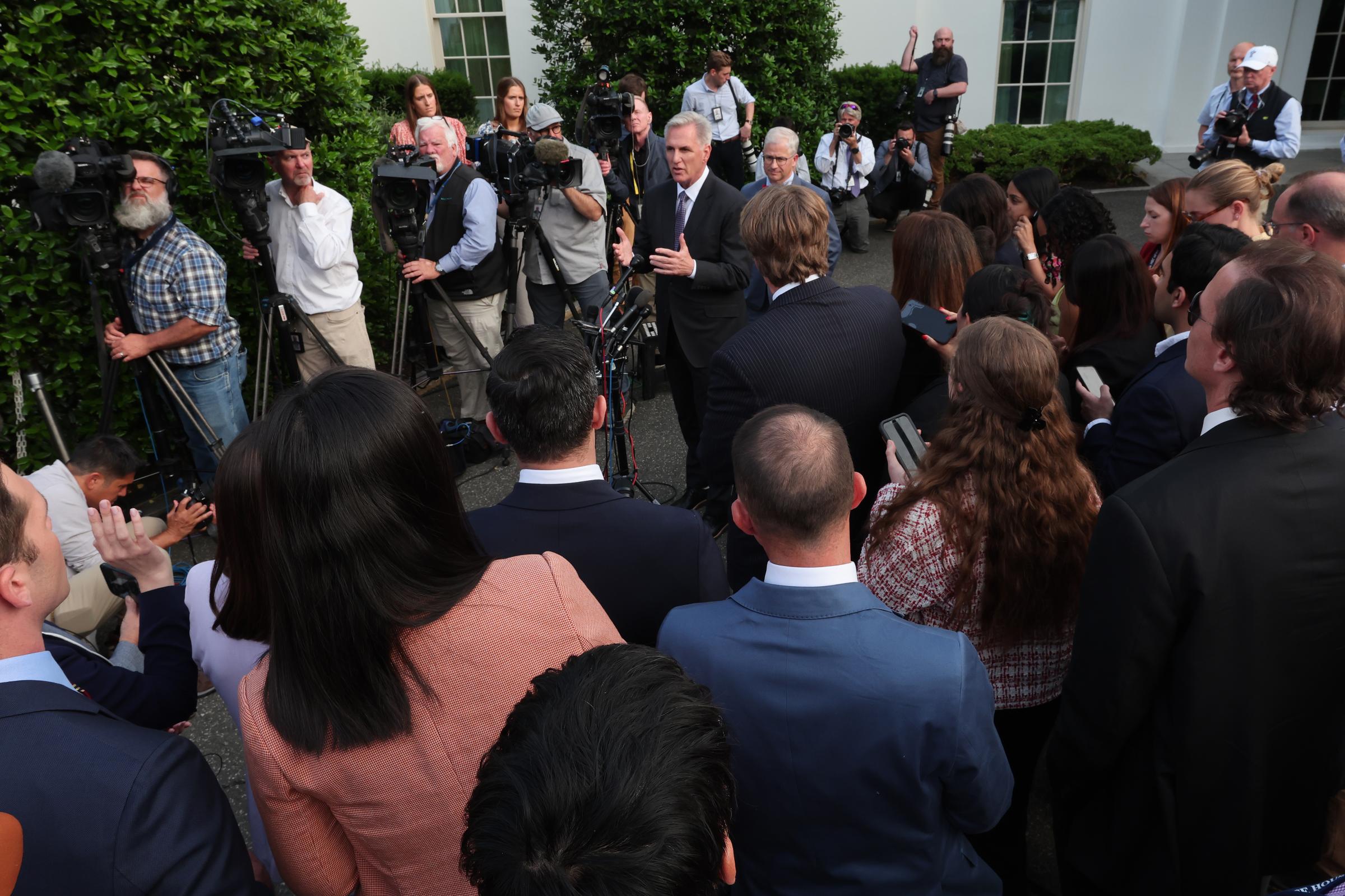House Speaker Kevin McCarthy emerged from a pivotal one-on-one meeting with President Joe Biden Monday without a deal to raise the debt limit, but expressed optimism about reaching an agreement in time to avert a potentially catastrophic federal default.
“I felt we had a productive discussion,” McCarthy said after the meeting. “I think the tone tonight was better than any other time we’ve had discussions.”
McCarthy has insisted the Republican-controlled House will not raise the debt ceiling, which refers to the maximum amount the U.S. is authorized to borrow to satisfy its obligations, without spending cuts attached. With just days to strike a pact before a looming June deadline, the two sides remain at odds over a GOP proposal to cut spending by imposing tougher work requirements for federal aid programs and introducing caps on future spending.
But the contours of a possible deal have been slowly taking shape. The two sides have discussed a framework for an agreement that would claw back some $30 billion in untapped COVID-19 relief money, approve permitting reforms for energy development, and impose spending caps through the end of 2024, according to those familiar with the talks.
Congress and the White House are running out of time to broker a deal before the U.S. Treasury runs out of cash to pay the government’s bills, leading to an unprecedented default. Treasury Secretary Janet Yellen reiterated Monday that funds were projected to run out in early June, and perhaps as soon as June 1. McCarthy says a deal must be reached this week to have enough time for legislation to pass through the House and Senate. Under legislative rules, House lawmakers have 72 hours to read the bill once the text is released.
Read More: What To Know About the History of the Debt Ceiling.

Like McCarthy, Biden described the meeting as “productive” in a statement, but noted that “areas of disagreement” remain. Monday’s face-to-face meeting marked the third Oval Office discussion on the debt ceiling between the two leaders. It came just one day after Biden returned from the Group of Seven summit in Japan to resume negotiations as pressure intensifies.
Sticking points remain. McCarthy has insisted that government spending in the coming fiscal year must be lower than it was last year, drawing pushback from Democrats, who want to keep spending flat from the 2023 fiscal year. Rep. Patrick McHenry of North Carolina, a key McCarthy ally who attended the meeting, told reporters that it would not be easy to resolve the issue.
“A directive to cut spending year over year is the toughest thing to do in Washington, but that is the Speaker’s directive to his negotiating team,” said McHenry, who serves as the House Financial Services Committee chairman.
More from TIME
Another key issue in discussions is the Republican proposal on work requirements for Medicaid, which the Biden Administration has said would result in millions of people losing coverage. The GOP has also introduced new cuts to food aid by making it harder for states to waive work requirements in places with high unemployment. The Congressional Budget Office predicted last month that if the GOP bill became law and tougher work requirements were imposed, about 600,000 Americans would lose health insurance and about 275,000 Americans per month would lose access to food stamps.
Read More: Could Joe Biden Use the 14th Amendment To Solve the Debt Ceiling?
McCarthy has previously said that work requirements for public assistance programs are non-negotiable in debt ceiling talks. On Sunday, Biden said House Republicans are taking “extreme positions” and called the GOP’s current proposal “unacceptable.” But McCarthy has so far held tight to demands for sharper spending cuts with caps on future spending, rejecting the alternatives put forth by the White House that call for reducing deficits in part with new revenue from tax increases to wealthy Americans.
“I think we should be looking at tax loopholes and making sure that the wealthy pay their fair share,” Biden said in the Oval Office before the meeting. “I think revenue matters, as long as you’re not taxing anybody under $400,000.”
McCarthy said his staff will continue to lead discussions with Biden, though the two leaders will likely “talk every day” until the debt ceiling is resolved.
More Must-Reads From TIME
- The 100 Most Influential People of 2024
- The Revolution of Yulia Navalnaya
- 6 Compliments That Land Every Time
- What's the Deal With the Bitcoin Halving?
- If You're Dating Right Now , You're Brave: Column
- The AI That Could Heal a Divided Internet
- Fallout Is a Brilliant Model for the Future of Video Game Adaptations
- Want Weekly Recs on What to Watch, Read, and More? Sign Up for Worth Your Time
Write to Nik Popli at nik.popli@time.com